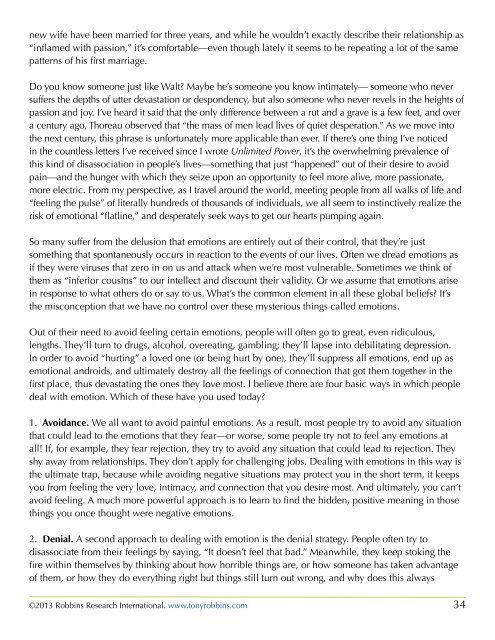Tony Robbins -Re-Awaken_the_Giant_Within
- No tags were found...
You also want an ePaper? Increase the reach of your titles
YUMPU automatically turns print PDFs into web optimized ePapers that Google loves.
new wife have been married for three years, and while he wouldn’t exactly describe <strong>the</strong>ir relationship as<br />
“inflamed with passion,” it’s comfortable—even though lately it seems to be repeating a lot of <strong>the</strong> same<br />
patterns of his first marriage.<br />
Do you know someone just like Walt? Maybe he’s someone you know intimately— someone who never<br />
suffers <strong>the</strong> depths of utter devastation or despondency, but also someone who never revels in <strong>the</strong> heights of<br />
passion and joy. I’ve heard it said that <strong>the</strong> only difference between a rut and a grave is a few feet, and over<br />
a century ago, Thoreau observed that “<strong>the</strong> mass of men lead lives of quiet desperation.” As we move into<br />
<strong>the</strong> next century, this phrase is unfortunately more applicable than ever. If <strong>the</strong>re’s one thing I’ve noticed<br />
in <strong>the</strong> countless letters I’ve received since I wrote Unlimited Power, it’s <strong>the</strong> overwhelming prevalence of<br />
this kind of disassociation in people’s lives—something that just “happened” out of <strong>the</strong>ir desire to avoid<br />
pain—and <strong>the</strong> hunger with which <strong>the</strong>y seize upon an opportunity to feel more alive, more passionate,<br />
more electric. From my perspective, as I travel around <strong>the</strong> world, meeting people from all walks of life and<br />
“feeling <strong>the</strong> pulse” of literally hundreds of thousands of individuals, we all seem to instinctively realize <strong>the</strong><br />
risk of emotional “flatline,” and desperately seek ways to get our hearts pumping again.<br />
So many suffer from <strong>the</strong> delusion that emotions are entirely out of <strong>the</strong>ir control, that <strong>the</strong>y’re just<br />
something that spontaneously occurs in reaction to <strong>the</strong> events of our lives. Often we dread emotions as<br />
if <strong>the</strong>y were viruses that zero in on us and attack when we’re most vulnerable. Sometimes we think of<br />
<strong>the</strong>m as “inferior cousins” to our intellect and discount <strong>the</strong>ir validity. Or we assume that emotions arise<br />
in response to what o<strong>the</strong>rs do or say to us. What’s <strong>the</strong> common element in all <strong>the</strong>se global beliefs? It’s<br />
<strong>the</strong> misconception that we have no control over <strong>the</strong>se mysterious things called emotions.<br />
Out of <strong>the</strong>ir need to avoid feeling certain emotions, people will often go to great, even ridiculous,<br />
lengths. They’ll turn to drugs, alcohol, overeating, gambling; <strong>the</strong>y’ll lapse into debilitating depression.<br />
In order to avoid “hurting” a loved one (or being hurt by one), <strong>the</strong>y’ll suppress all emotions, end up as<br />
emotional androids, and ultimately destroy all <strong>the</strong> feelings of connection that got <strong>the</strong>m toge<strong>the</strong>r in <strong>the</strong><br />
first place, thus devastating <strong>the</strong> ones <strong>the</strong>y love most. I believe <strong>the</strong>re are four basic ways in which people<br />
deal with emotion. Which of <strong>the</strong>se have you used today?<br />
1. Avoidance. We all want to avoid painful emotions. As a result, most people try to avoid any situation<br />
that could lead to <strong>the</strong> emotions that <strong>the</strong>y fear—or worse, some people try not to feel any emotions at<br />
all! If, for example, <strong>the</strong>y fear rejection, <strong>the</strong>y try to avoid any situation that could lead to rejection. They<br />
shy away from relationships. They don’t apply for challenging jobs. Dealing with emotions in this way is<br />
<strong>the</strong> ultimate trap, because while avoiding negative situations may protect you in <strong>the</strong> short term, it keeps<br />
you from feeling <strong>the</strong> very love, intimacy, and connection that you desire most. And ultimately, you can’t<br />
avoid feeling. A much more powerful approach is to learn to find <strong>the</strong> hidden, positive meaning in those<br />
things you once thought were negative emotions.<br />
2. Denial. A second approach to dealing with emotion is <strong>the</strong> denial strategy. People often try to<br />
disassociate from <strong>the</strong>ir feelings by saying, “It doesn’t feel that bad.” Meanwhile, <strong>the</strong>y keep stoking <strong>the</strong><br />
fire within <strong>the</strong>mselves by thinking about how horrible things are, or how someone has taken advantage<br />
of <strong>the</strong>m, or how <strong>the</strong>y do everything right but things still turn out wrong, and why does this always<br />
©2013 <strong>Robbins</strong> <strong>Re</strong>search International. www.tonyrobbins.com 34


